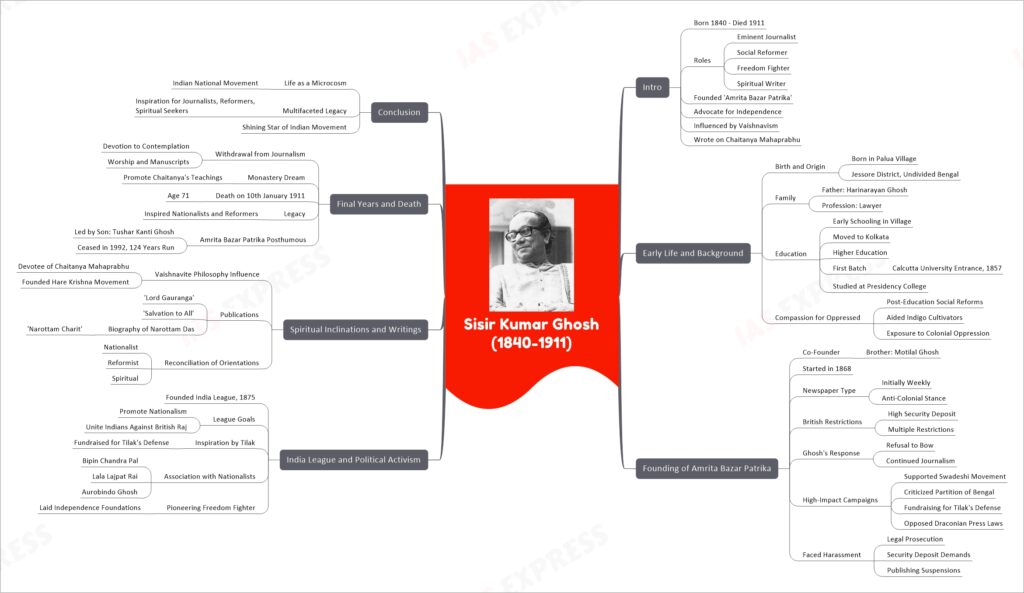Sisir Kumar Ghosh: Amrita Bazar Patrika & India League
Sisir Kumar Ghosh (1840-1911) was an eminent Indian journalist, social reformer, freedom fighter, and spiritual writer. He founded the iconic Bengali newspaper ‘Amrita Bazar Patrika’ in 1868 and played a pioneering role in Indian journalism. Ghosh was a staunch advocate for India’s independence from British rule and campaigned extensively through his writings against colonial oppression. Alongside his political activism, he was also deeply influenced by Vaishnavism and wrote extensively on the mystic saint Chaitanya Mahaprabhu.
Early Life and Background
- Sisir Kumar Ghosh was born in 1840 in the village of Palua in the Jessore district of undivided Bengal (present-day Bangladesh).
- His father, Harinarayan Ghosh, was a lawyer in Jessore.
- After early schooling in his village, Ghosh moved to Kolkata for higher education.
- He was among the first batch of students to clear the entrance exam conducted by the newly established Calcutta University in 1857.
- He subsequently studied at the Presidency College.
- Even as a young student, Ghosh displayed great compassion for the oppressed and downtrodden in society.
- After finishing his formal education, he dedicated himself to social reform causes, especially helping indigo cultivators who faced exploitation from planters.
- This early exposure to injustice and colonial oppression shaped his political views and journalism later on.
Founding of Amrita Bazar Patrika
- In 1868, along with his brother Motilal Ghosh, Sisir Kumar founded the iconic Bengali newspaper ‘Amrita Bazar Patrika’.
- It started as a weekly newspaper and soon grew in popularity due to its fiery anti-colonial stance.
- The British administration imposed multiple restrictions on the publication at various points, including demanding a high security deposit.
- But Sisir Ghosh refused to bow down and continued his fearless journalism.
- Under Ghosh’s leadership, the Amrita Bazar Patrika ran several high-impact campaigns against colonial policies:
- Strongly supported the Swadeshi movement and promoted domestic industries.
- Criticized the Partition of Bengal and the brutal suppression of protests.
- Raised funds for Bal Gangadhar Tilak’s legal defense in the sedition case against him.
- Opposed restrictions imposed on civil liberties of Indians under the draconian press laws.
- For his nationalist journalism, Ghosh faced constant harassment from the British authorities in forms of legal prosecution, demands for security deposits, and temporary suspensions of publishing.
- But he soldiered on undeterred in his fight against the Raj.
India League and Political Activism
- Apart from journalism, Sisir Ghosh was also actively involved in the Indian independence movement, especially through the organization he founded called ‘India League’ in 1875.
- The goal of the India League was to promote nationalism among Indians and unite them across regional, religious, and class divisions against the British Raj.
- Ghosh was deeply inspired by the ideals and vision of Bal Gangadhar Tilak.
- When Tilak was imprisoned by the British on sedition charges, Ghosh raised funds for his legal defense.
- He was also closely associated with other leading nationalist figures like Bipin Chandra Pal, Lala Lajpat Rai, and Aurobindo Ghosh.
- Through both his journalism and political activism, Ghosh tirelessly worked to expose colonial exploitation and strengthen the nationalist movement.
- He was among the pioneering freedom fighters who laid the foundations for India’s eventual independence.
Spiritual Inclinations and Writings
- Apart from his socio-political activism, Sisir Ghosh was also deeply influenced by spiritual ideals, especially Vaishnavite philosophy.
- He was an ardent devotee of Chaitanya Mahaprabhu, the 15th century mystic saint who founded the Hare Krishna movement.
- Ghosh wrote extensively on Chaitanya’s life and teachings in books like ‘Lord Gauranga’ and ‘Salvation to All’.
- He highlighted Chaitanya’s message of love, equality, and bhakti marga (path of devotion).
- He also authored a biography titled ‘Narottam Charit’ on the Vaishnava saint Narottam Das.
- Through his spiritual writings, Ghosh emerged as a prominent voice for promoting the Vaishnava philosophy and devotional worship among modern Indians.
- He skillfully reconciled his nationalist, reformist, and spiritual orientations – seeing no contradictions between the three.
Final Years and Death
- In his final years, Sisir Kumar Ghosh gradually withdrew from his journalistic pursuits and public life.
- Much of his time was devoted to contemplation, worship, and working on his manuscripts focused on Vaishnavism.
- He nurtured a dream of setting up a monastery to promote Chaitanya’s teachings.
- Ghosh passed away on 10th January 1911 at the age of 71, leaving behind an unmatched legacy as a journalist, freedom fighter, and spiritual seeker.
- He inspired a generation of nationalists and social reformers through his courageous life dedicated to the service of the motherland.
- The Amrita Bazar Patrika continued to be published under the stewardship of his son Tushar Kanti Ghosh before finally ceasing publication in 1992, after an illustrious innings of 124 years.
- Sisir Ghosh’s pioneering contribution left a lasting impact on Indian journalism and the freedom struggle.
Conclusion
In many ways, Sisir Kumar Ghosh’s life serves as a microcosm of the Indian national movement – spanning the literary, social, political, and spiritual spheres. Ghosh’s multifaceted legacy continues to inspire later generations of journalists, reformers, and spiritual seekers. Through his courageous life dedicated to the service of the motherland, Ghosh emerges as one of the shining stars of the Indian national movement.


